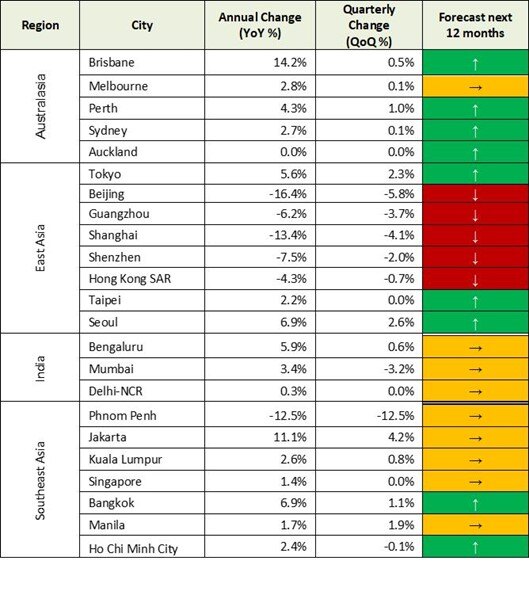Southeast Asia’s office markets have displayed robust recovery in Q1 2025 amidst significant regional shifts, according to Knight Frank’s latest Asia-Pacific Prime Office Rental Index. Jakarta, reversing an 18-month decline, leads this resurgence, buoyed by reduced new supply entering the market, thereby stabilising rents and lowering vacancies.

Meanwhile, Indian markets achieved a record-breaking leasing volume of 1.7 million square meters, driven by a surge in transactions in Bengaluru’s Global Capability Centers. Seoul marked its 17th consecutive quarter of rental growth, registering a 6.9% year-on-year increase, with minimal vacancy rates due to strong demand in the financial sector.
The positive momentum extended across Southeast Asia, with average rents increasing by 1.3% quarter-on-quarter, driven notably by Jakarta, Kuala Lumpur, and Bangkok. These cities saw improved conditions amidst growing demand from tech firms and multinational corporations expanding their regional footprints.
Looking ahead, Knight Frank’s global head of occupier strategy and solutions, Tim Armstrong, highlighted the evolving impact of trade dynamics, anticipating cautious optimism among occupiers as they navigate uncertainties. Despite challenges, India and emerging Southeast Asia are expected to maintain resilience, driven by diversification strategies in response to the evolving global economic landscape.
Key highlights from the Q1 2025 report include stable or increasing rents in 17 of 23 monitored Asia-Pacific cities year-on-year, underscoring regional stability amid varied market performances. Vacancy rates remained steady despite new supply additions, with India and Southeast Asia offsetting these impacts through tightening availabilities.
While broader Asia-Pacific prime rents saw a slight decline quarter-on-quarter, the region’s outlook remains positive, with markets like Brisbane showing signs of rental growth moderation. Singapore’s prime office rents remained stable as occupiers explored cost-neutral alternatives amidst evolving market conditions.
Christine Li, Knight Frank’s head of research, Asia-Pacific, noted landlords’ focus on occupancy amidst economic uncertainty, maintaining flat vacancies but observing softer rental trends, particularly outside mainland China. As global trade tensions persist, the market faces ongoing unpredictability, influencing occupiers’ long-term real estate decisions and prompting landlords to adopt flexible leasing strategies.
Overall, while challenges persist, Southeast Asia’s office markets show resilience and adaptability, poised to navigate future uncertainties with strategic real estate decisions.







